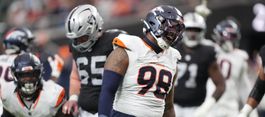Should tight end even be a designated starting position on your fantasy football roster anymore?
It’s a question that is at least worth asking. As the NFL continues to shift toward three- and four-wide receiver sets more frequently, tight end has started to become extinct from a fantasy perspective.
It’s rare for the tight end position to offer a large number of prolific players on a yearly basis. And last year, Taysom Hill finished as the No. 5 tight end despite catching just nine passes. That’s how absurd the position can be at times.
If you ask me, there are two tiers at tight end: Travis Kelce and everyone else. So how should you handle this position in your upcoming drafts?
- More Fantasy Football Advice
- Snake Draft Pick Strategy: Early | Middle | Late
- Draft Targets for Every Round: Early | Middle | Late
- Fantasy Football Draft Strategy
State of the Tight End Position in Fantasy Football
There are many strategies to approach the tight end position and considerations while drafting, but here are my recommendations.
Let’s Talk Travis Kelce
The first question you have to ask yourself when deciding your tight end strategy is whether Travis Kelce is worth using a first-round pick on. Yes, you read that correctly. Travis Kelce is ranked as the No. 8 player in our Expert Consensus Rankings. If you’re going to get him, it’ll likely have to be in Round 1.
But is that prudent? That answer is more complex. Kelce put up 261 fantasy points in 2022, blowing away the competition at his position. But how did Kelce’s season compare when you lump him in as a wide receiver? Quite well, actually. Kelce would’ve been the WR5 last season with his numbers.
However, there’s a realistic chance that Kelce’s 2022 season will represent his professional peak. In fact, Kelce set career-highs in targets, receptions, and touchdowns while posting his second-most yards in a single season. He’ll also turn 34 in October, and I have at least some questions about Kansas City’s receiving depth chart.
For me, it comes down to price. I can’t justify paying absolute top dollar for Kelce, even while acknowledging the enormous advantage he gives you at the position each week. Maybe Kelce dunks on me and delivers another exceptional season to cement his legacy as arguably the greatest tight end to ever play. But the only way that drafting him in the back half of Round 1 works is if he replicates his 2022 performance.
What About the Rest of the “Elites”?
The market seems to disagree with my notion that there are only two tiers at tight end. I’ll concede that there might be three, with the second tier consisting of Mark Andrews, T.J. Hockenson, and George Kittle.
Injuries and inconsistent quarterback play left a bad taste in the mouth of anyone who took Andrews early last season. He still finished as the TE4 and he could certainly benefit from the new offensive scheme in Baltimore. But like Kelce, I can’t justify him as a late second or early third round pick.
Hockenson is also someone that I’m out on at his current ranking and ADP. He doesn’t give you as much of a weekly advantage as Kelce or Andrews, and there are usually running backs and receivers I value more in the same range as Hockenson.
If I’m taking any of these guys, I’ll go with the cheapest. Right now, that’s Kittle, who has as much upside as any of the players ranked ahead of him. His floor is a little lower because of his durability concerns, but he’d be the guy I’d target if you’re dead set on taking one of the top four tight ends.
My Tight End Strategy: Wait
Unlike quarterback, where I may be more willing to draft one earlier than in previous years, I’m not budging on my tight end strategy in 2023. My recommendation is to wait and try to land this year’s version of Evan Engram. Engram came into the year lightly regarded and was someone I recommended as a late-round option. He wound up as the TE6, which is all I’m really asking for out of my tight end.
I’m largely bypassing the “middle class,” which includes players like Dallas Goedert, Kyle Pitts, Darren Waller, Evan Engram, and Pat Freiermuth. While I’d consider guys like Goedert and Pitts, they aren’t players I’m actively seeking out. Both are being drafted around the end of Round 5 and beginning of Round 6, which is when I’m looking to add depth at more critical positions.
So who are some of those late-round flyers to take a shot on?
My top late round TE target is Juwan Johnson, who amazingly finished as the TE11 despite catching only 42 balls. His seven touchdowns played a big role, but I think Johnson could see more usage with Derek Carr under center. Carr made Darren Waller a fantasy-relevant tight end, and Johnson could see more targets as the safety valve for a notoriously conservative quarterback.
I’m also intrigued by Greg Dulcich, who showed some flashes as a rookie. The arrival of Sean Payton could bode well, as we’ve seen tight ends such as Jimmy Graham thrive in his system.
Hopefully, one of these guys can pan out and become a decent starter. If not, there’s no harm in playing tight end roulette on the waiver wire.
Subscribe: Apple Podcasts | Spotify | Google Podcasts | Stitcher | SoundCloud | iHeartRadio










